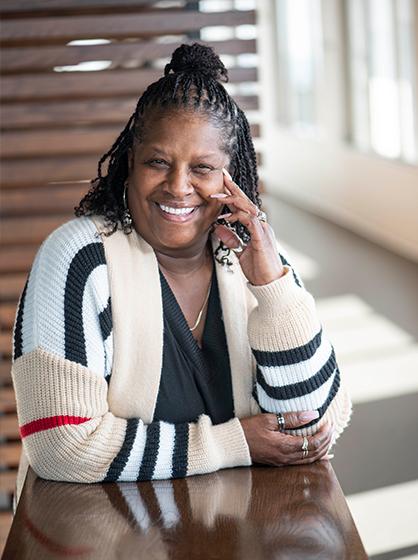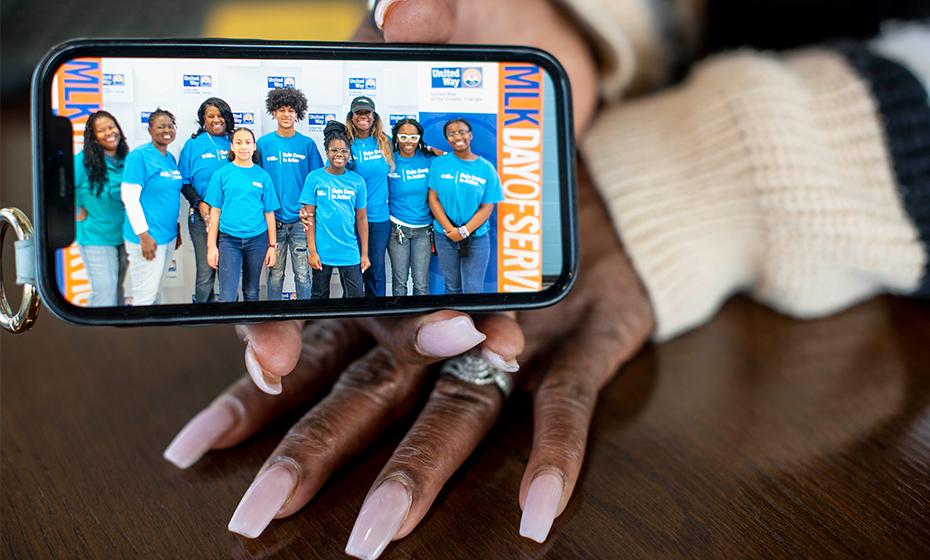Her Family Was Active in the Civil Rights Movement. Now She Aims To Lift Up Black History
Benita Harrington's exposure to the movement developed into a passion for advocacy, both in her personal life and at Duke Energy
Benita Harrington is a wife, a mother and a grandmother. She is also a veteran of the U.S. Army and National Guard (1987 to 1999), and someone who loves to hit the open road on her Hayabusa 1300 sport bike.
“I love the adrenaline rush,” she said. “It’s exhilarating.”
Harrington’s colleagues know her as a senior real estate representative, a project manager of land and easement purchases for Duke Energy’s Natural Gas Business Unit in the Carolina's. Task her with a project and there is no stone left unturned, said Harrington’s former supervisor, Ebony Wiggins.
“Benita steers people to excellence. To do more. To do better,” Wiggins said. “She learns and she teaches. So, she is always paying it forward.”
Harrington’s service-minded attitude began at an early age. The North Carolina native was born into a family active in the Civil Rights Movement. Even as a child, she worked alongside local and state leaders in Erwin, N.C., fighting for change. And she was one of just a few Black students to attend an elementary school that was newly desegregated.
Her exposure to the movement developed into a passion for advocacy, a thread woven deeply into Harrington’s personal and professional lives.
“It’s about legacy,” she said, “the transformation of where we’ve come from, what we grew out of and standing on that … the hands that built where and who we are today.”
For Harrington, Black history is not a month – but something she lives and honors every day. It’s about shining a light on the smaller, quieter stories of Black history. The people who aren’t honored with holidays and memorials. Like the 109-year-old woman whom Harrington takes to the polls when it’s time to vote.
She is vice president of her local NAACP, the nation's oldest civil rights organization. And chair of the Raleigh, N.C., chapter of Advocates for African Americans (A³), one of many Duke Energy employee resource groups.
“It doesn’t surprise me to see Benita with anyone,” Wiggins said. “She’s inclusive of all groups. She sees people through their hearts.”
Through A³, Harrington embraces the opportunity to engage and connect with her Duke Energy colleagues, especially through topics and events that can spark tough conversations.
When the national conversation focused on the killing of George Floyd, Floyd’s relatives spoke at an A³ event – standing on the principle of being “change makers, not victims.” Later, police officers were invited to discuss policing in America.
“If not me, who?” Harrington said. “If no one puts in the work, how does it happen? How does change happen? For me, it’s natural. … It’s just something I’ve always done.”
Sam Spilman sees firsthand how her excitement and passion draw people in.
In his day-to-day job, Spilman is the director of project management and customer delivery in Duke Energy’s eastern Carolina’s region. He also sponsors the Raleigh chapter of A³, working closely with Harrington in that role.
Spilman credits her with growing both the group’s membership and its leadership team.
“Benita has a nice balance between driving action and [being] a joy to be around,” he said. “She’s both fun and mission-driven to make sure we get things done.”
Harrington is only a few generations removed from the shadows of slavery. Her late mother was the first in their family to attend college. Her grandmother, a housekeeper, cleaned two houses a day. Harrington will never forget the day – she was about 8 years old – when her grandmother quit, refusing to get on her knees and clean baseboards with a toothbrush (a task not included in her job description).
“She stood on her principles,” Harrington said. “And that’s what she instilled in us.”
So much of who Harrington is and how she sees the world is grounded in her family and her roots.
“My grandkids still sit around my dad and say, ‘Tell me about when you were in school.’ And it’s the legacy we pass down that – for me – is Black history … knowing where you came from and where you’re headed.”
Art contributes to the advancement of society
The 2024 theme of Black History Month is "African Americans and the Arts," spanning the many impacts Black Americans have had on visual arts, music, cultural movements and more.
Art has a unique ability to communicate emotions, promote empathy and raise awareness of social issues. Art can also inspire action and drive change by challenging norms and motivating individuals to advocate for a more just and equitable society.
We share the story of a three-dimensional mural at Duke Energy Plaza, the company's new headquarters, designed to symbolize the history and cultural heritage of the former Brooklyn neighborhood in Charlotte.
View original content here.






